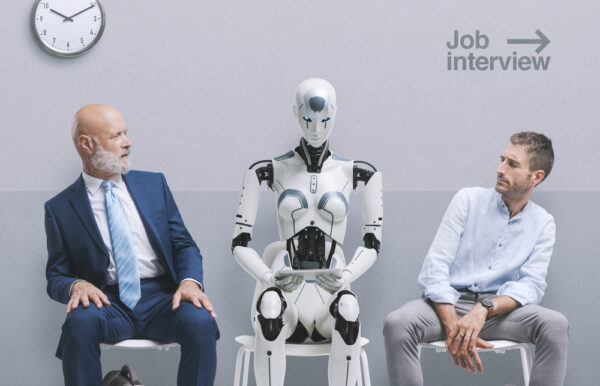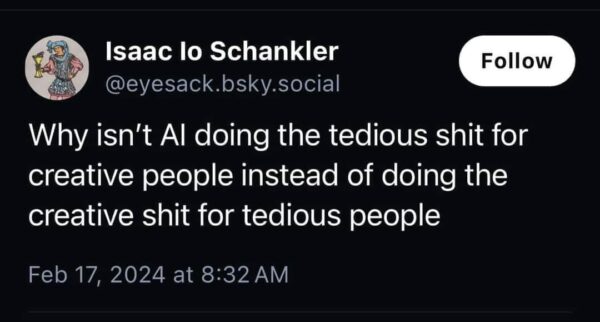
I’m a sci-fi writer, which means, among other things, that I am tasked with thinking about the future and how it will unfold and sharing this with my readers.
And there’s a lot to think about these days. There’s climate change, first and foremost – if it goes unaddressed, it will eventually smash human civilization to bits. There’s the rise of right-wing populism, which threatens to upend democratic institutions around the world (and already has in many places).
But nothing has captured the public imagination at this moment more than Generative AI, and its impacts on the human condition.
Something happened on the way to the promised technological nirvana that few people expected. The plan was, as many science fiction writers have previously predicted, that machines would become better and better at doing all that laborious grunt work that we despise, freeing us to live a carefree life of eating bunches of grapes and finding our true avocation – painting colorful pictures, making lovely pottery, or creating pretty sculptures.
The robots would clean the floors while the rest of us would spend our days in the happy pursuit of life.

Never mind the fact that it was never quite clear where the money would come for us all to live on. Maybe we’d somehow evolve into a Star-Trek-like post-scarcity society, where there is no money at all, and we all just get what we need?
Or the fact that there are many people out there without an artistic bone in their bodies, who would be hard-pressed to find a non-work thing that would bring them joy. Though maybe for them it would be sports, or fishing, or playing video games?
The whole idea always seemed a little hollow to me, but at least it was a utopian vision of the world.
What we’re getting now is something more dystopian – far different, and darker. Instead of robots and artificial intelligence being built to make our lives easier, Big Tech has created Generative AI apps, built on materials used without permission, that can take over the most human of things – the arts. Not to mention a whole bunch of white collar jobs too. The head of the Bird Site said the quiet part out loud about Gen AI:
“Probably none of us will have a job,”
Paragon of Human Intellect and Decency Elon Musk
This kind of thing has happened before. The Luddites, though we think of them as being anti-technology (and use their name as slang for just that), were in fact textile factory workers reacting against automation that threatened their jobs, and were seeking a way to integrate the technology instead of being wiped out by it. Instead they were crushed.
And in the last few decases, robotics have replaced many of our factory workers too. Just forty-five minutes away from here, the Jelly Belly factory in Vacaville is a wonder of robotic automation. You can take a tour through it, watching the robots move, sort, pack and ship these little bursts of flavor. They move with speed and precision, and never tire out – though I imagine they can still break down. There are still humans on the factory floor, but you can’t help but wonder how many more had jobs there, and at factories around the world, before the robots moved in.
So we find ourselves at an inflection point. What happens if almost all of our jobs are replaced by AI and robots?
Have we even begun to grapple with this possibility? What would such a sea-change do to unemployment rates? Where would the money come from to create a Universal Basic Income so we all don’t starve? Or better yet, a Universal High Income? And what will we do with our copious “free” time, when even “art” can be created faster, cheaper, and in some ways better than we can create it ourselves?
Gen AI is currently being shoehorned into everything, even as there are signs it really doesn’t work all that well. It’s now in my Google searches, my Facebook Search, in Adobe Photoshop, and in the customer service chatbots we interact with when we just want to talk to a human being. Apple just announced a deal to stick it into Siri. And even religion isn’t immune from the AI tide – a Catholic Group recently created an AI priest, though the title “priest” was later removed, since you can’t (yet) ordain an AI “entity.”
As a society, we urgently need to have a conversation around all of these issues.
How should artists be compensated when their work is scraped to train these Gen AI apps, and how can they opt-out? How much can we trust these models, when they regularly hallucinate non-existent things? How much is Gen AI contributing to climate change? And as companies use it to replace us, what responsibilities do they have to their workers, to society and the world, as they reap the financial benefits and make the rest of us poorer?
And finally, if this version of “AI” is built on stealing human knowledge, why would any of us keep creating it and putting it on the web? Google, for instance, now often supplies an AI summary of content found on multiple sites that’s supposed to be relevant to the user’s search. Yes, they supply links at the bottom to tell you where the information came from. But once you have it, how often do you ever actually visit those sites, giving them the traffic they need to survive?
There are those who say Gen AI will eventually collapse upon itself, as it exhausts sources of “good” information and begins to feed on its own corrupted output. That’s a real possibility (though companies are looking for solutions to this). But even so, how much damage will it do to our belief in facts, truth, and verifiable reality before it collapses?
I don’t have any real answers for you. I have thoughts, among which is that the Gen AI revolution will conversely add value to art, writing, and work actually done by real humans. Many people, disenchanted by the big tech folks and the AI being force-fed to us, will seek out other humans to find human-made art, work, and products.
Will this be enough? I have no idea. Part of me thinks we’ll retreat to a fat-but-happy do-nothing reality a’la Wally, or a virtual world like the Matrix, where we can pretend to lead productive lives while the robots tend our sleeping bodies.
But the ever-optimistic part of me hopes this will eventually roll over in our favor, if we can just take the time to get the details right. Generative AI is a powerful technology, and if we can insist that it is made to serve us rather than the other way around, it could be game changing in a positive way.
There’s no guarantee of a happy outcome… just ask the Luddites.
But it is guaranteed that none of this will happen if we don’t start talking about it now – with each other, with our legislators, and with these companies who are forcing this change, and finding ways to bend this technology to our needs.
We should be the ones deciding what it will mean to be human. Not AI.
